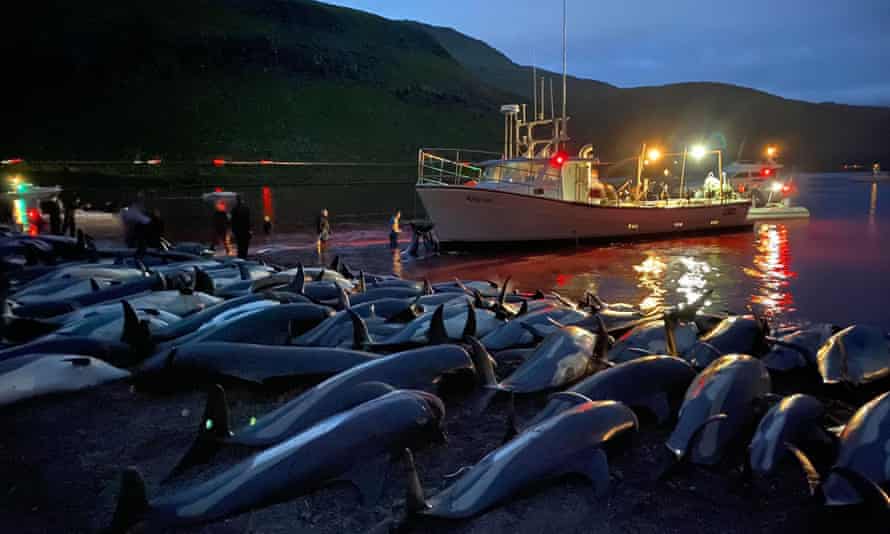Horror at the Faroes dolphin slaughter is only human – but it risks hypocrisy

Our response to a mass cetacean hunt reveals man’s duplicitous attitudes to animals

Witnessing the mass movement of wild animals can seem to be a rebuttal of the disastrous news we hear, daily, of our natural environment. We know they are threatened, in their very choreography, but in the sight of them, the eternal optimism of the human spirit is encouraged to think that all is not lost.
In the past few days we’ve seen moving stories of massed southern right whales feeding off New South Wales. Only then, bitterly, to have the Dantean alternative presented to us, in the piles of bloody dolphin carcases on a quay in the Faroe Islands.
On Sunday 1,428 marine mammals were killed en masse as part of the island’s “Grind” tradition. A particularly harsh word, to anglophone ears, for an exceedingly harsh sight: wild, social, intelligent, intuitive creatures, particularly beloved of human beings, dumped and slumped out of their element like so many sardines.
As emotive as these scenes from the Faroes are, and as ferocious the public and media reaction to them is – not least from some islanders themselves, with claims that the superpod of Atlantic white-sided dolphins that died this week are not a traditional part of the hunt – there are deep cultural contexts for this cull.
There are many narratives of indigenous hunting still being carried out, from Alaska to islands off Indonesia and in the Caribbean. In Taiji, on the south-east coast of Japan, the annual dolphin hunt began on 1 September, conveniently coming after this year’s Olympic and Paralympic Games and avoiding any possible boycott: a bloody sort of games this, with a potential quota of 1,849 cetaceans from nine species.
Whales and dolphins are driven ashore, vocalising their pain as they die, in remote places. That vocalisation being the epitome of distress for animals who live almost entirely in a world of sound, intimately connected by it, the aural, sensory expression of their collectivity. Sound is their place, just as other cetaceans are their “home”.
But perhaps the Faroes incident has hit harder because the islands seem to be within our remit. Geographically too close; too “European”? In fact, the Faroe Islands, despite being within the kingdom of Denmark, have set themselves beyond the reaches of the EU. They have not found it to be in their interests to become part of that project.
We humans set arbitrary limits in our daily hypocrisies and projects. Necessarily. Wild birds shot over Mediterranean shores or abandoned dogs provoke sadness. But every minute of the day we slaughter countless animals for food. We consume animals as units without a thought. What difference is there if a thousand or more dolphins should die?
Is it because of our relentless anthropomorphism? That we project our physical, or idealised selves on to animals? When do wild animals become our pets? Dolphins appear as our alternative selves: perfected, Edenic versions, antediluvian humanoids. Innocents, who left the land before we spoilt it, besporting themselves carelessly in the sea, unburdened by our wants.
What do we want them to be? Performers in dolphinariums, prisoners of our entertainment, paid in fish to act out a part? Millions of tourists each year spend money for this pleasure – the pain of thousands of such animals kept in confinement around the world, from China to Europe and the US – is ignored. Animals who possess culture – as we now know cetaceans do – become assimilated into our culture. It is their fate, and ours, even as we realise that we need to refer to them as a “who”, not a what; as individuals, not a collective mass of otherness.
We put them to our use, whatever we do. And yet. Aren’t we beautiful humans ourselves precisely because of our faults? For all our venalities, our pity, flawed as it is, is to be admired. And if we can’t weep over other species, how can we be expected to weep for ourselves?
-
Philip Hoare is an author whose books include Leviathan, Or the Whale